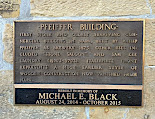There is an unprepossessing building in Napa, located at 1245 Main street, which has a rather checkered history. Originally built as the Pfeiffer Building in 1875, it is the oldest commercial and oldest stone building in the city of Napa. It has been part of a brewery, a boarding house and alleged bordello, a saloon, a laundry involved in a famous series of court cases, a meat market and deli, and most recently, a wine tasting bar.
The Pfieffer Building was built by Phillip Pfeiffer and was part of Barth’s Bavarian Brewery, arguably the first brewery in Napa. By 1901, it housed the “Old Stone Saloon” and in 1937, Sam Kee moved his laundry business into the building. The building housed the Sam Kee laundry until 1977, when the business, then owned by Bik Wong, closed its doors for good, the last remnant of a Chinatown and Chinese laundries in Napa. It then housed Andrews Meat Market and Deli until 2002 when Vintner’s Collective moved in. The building was heavily damaged in the 2014 Earthquake and rebuilt.
While all of this is important, Sam Kee and his business were very important in United States legal history. In the mid 1800s, Chinese immigrants to the United States were generally well received. There was a labor shortage, especially in California and the Chinese who came here filled the gap. This was not to last long. Competition in the Gold Fields and the completion of the Transcontinental Railroad, meant that there were thousands of young Chinese men who were willing to work for lower wages than Americans. This led to a rapid rise in anti-Chinese discrimination, especially in California and the western states. After California passed a series of anti-Chinese laws, many of which were soon found unconstitutional, Congress passed the Chinese Exclusion Act of 1882, which forbid any immigration from China and forbade citizenship to Chinese immigrants. This was a stark reversal of the Burlingame Treaty of thirty tears earlier which allowed Chinese people to immigrate freely to the United States.
In the wake of the Chinese Exclusion Act, many cities and towns began to pass “nuisance” laws, that while being non-discriminatory on their face, were applied almost exclusively to the Chinese residents of the city or town. Napa was one of these. In 1887, Sam Kee was arrested and fined for operating a “public laundry” within the city of Napa. A recently enacted municipal ordinance declared that public laundries were a “nuisance” and the operator would be fined 100 dollars or put in jail for refusal to pay the fine, “not to exceed one day for each dollar of the fine”. Sam Kee refused to pay the fine and was subsequently jailed. He then asked the 9th Circuit Court of Appeals for a Writ of Habeus Corpus. Habeus Corpus was granted in In Re Sam Kee, 31 F. 680 (9th Cir. 1887) because the US Supreme Court had recently decided Yick Wo v. Hopkins, 118 U.S. 356, 6 S. Ct. 1064 (1886) and the Ninth Circuit had previously decided The Stockton Laundry Case, 26 F. 611 (9th Cir. 1886). Both of these cases declared “nuisance laws” in violation of the 14th Amendment of the United States when disproportionately applied to Chinese businesses.
In the opinion of the court, it was noted that the laundry had been operating in Napa for twenty years and that Sam Kee had been its owner for eight. Thus, the building Phillip Pfeiffer had built in 1875 housed a business not only with a long history in Napa, but also one that played a small part in ending discrimination against Chinese. It wouldn’t be until 1943 that the Chinese Exclusion Act was repealed, but the striking of “nuisance laws” was a first step.
GETTING THERE: From 414 Mason Street: Take Interstate 80 East toward Sacramento and then take Exit 33 onto CA-37W; then take Exit 19 onto CA-29N toward Napa. Take CA-221N and then stay on Soscol Avenue. Follow Soscol Avenue to Clinton Street. Turn left on Clinton Street and the building will be four blocks up on the left hand side.

